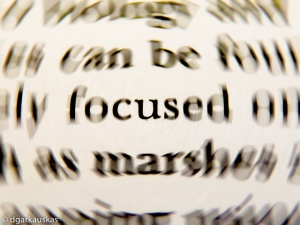A few months ago, I overheard one of our peer consultant, Chris, speaking excitedly about the end stages of a paper. “I just love that moment when it all comes together,” he said. “It’s like magic.”
I agreed that those end stages of a paper can feel magical. When connections between

Image Source: Flicker user Christophe Verdier
different ideas appear and the work you put into research and writing starts to pay off, it can feel exhilarating. I recall Seamus Heaney noting these feelings at a reading some years ago. An audience member asked Heaney what his favorite part of writing a poem was and Heaney said that it was when the poem could get up on its own two legs, move around, and surprise him, showing him ideas or meanings he hadn’t thought of before.
When I tell that Heaney story to classes, some students struggle with the idea that any piece of writing could surprise them. For these writers, that magical moment seems impossible. The end stages of a paper seem at best a relief of stress and frustration. At worst, they confirm the writer’s feelings of self doubt and failure. In these cases, the idea that there is a magic to writing can have a negative effect. If writing is magic, then those writers who don’t feel that mystical exhilaration may give up too soon, imagining that they just can’t cut it.
For all, writing can be like magic, but it won’t be the kind of magic that appears in fairy tales. The magic in writing shares much more in common with the magic you might see on stage at a Vegas nightclub. It may look slick, as if it defies the laws of physics, but it’s all a well practiced illusion. As writers, understanding the basis of these illusions provides us with a lot that we can steal to improve on our own texts. Continue reading ‘Writing is like magic: only not in the way you expect’




